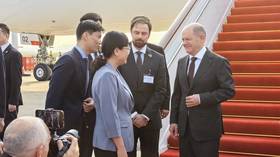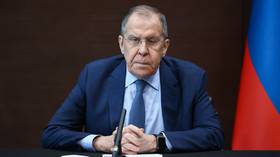China reveals plan to end Ukraine conflict

World powers should focus on restoring peace and stability in Ukraine rather than seeking “selfish gains,” Chinese President Xi Jinping said during a meeting with German Chancellor Olaf Scholz on Tuesday.
The chancellor arrived in China on Sunday, accompanied by a large delegation of ministers and business executives.
Meeting with Scholz at Beijing’s Diaoyutai State Guesthouse, Xi told the German leader that all parties should work together to restore peace in Ukraine as soon as possible. The Chinese leader also outlined four principles that he believes will prevent the conflict from escalating.
“First, we should prioritize the upholding of peace and stability and refrain from seeking selfish gains,” Xi said, as quoted by the Xinhua news agency.
The next step, according to Xi, would be to stop “adding fuel to the fire,” which would enable conditions for the restoration of peace.
The Chinese leader also called for a reduction of the impact of the conflict on the global economy, and for parties to “refrain from undermining the stability of global industrial and supply chains.”
Scholz, whose three-day trip to China is the second since he took office in 2021, told Xi that he is willing to discuss “how we can contribute more to a just peace in Ukraine.” The ongoing crisis has affected Germany’s “core interests” and has disrupted energy supplies and global trade, the chancellor added.
According to Scholz, the hostilities have also had a negative impact on European security and risk damaging the “entire international order.”
China, which has insisted it is neutral in the Ukraine conflict, has been widely criticized by the West for refusing to condemn Moscow’s military operation.
The strategic partnership between Moscow and Beijing has strengthened since the Ukraine crisis broke out, as the two countries have ramped up economic cooperation and diplomatic ties.
Beijing has long urged peace talks between Ukraine and Russia, and issued a 12-point peace plan to end the hostilities on the first anniversary of the conflict in February 2023.
The initiative, hailed by Moscow, includes a call for a cessation of hostilities, the resumption of peace talks, abandoning a “Cold War mentality,” and respecting the sovereignty of all nations.
In contrast to Beijing’s proposal to end the fighting, Kiev’s ten-point peace formula first presented by President Vladimir Zelensky in the autumn of 2022 demands the complete and unconditional withdrawal of Russian forces from all territories within Ukraine’s 1991 borders.
Russian Foreign Minister Sergey Lavrov has described Zelensky’s peace formula as an “absolutely hollow” ultimatum that is “divorced from reality.”














